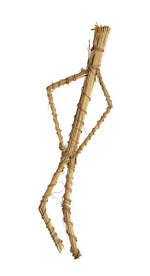|
Born 29 June 1921 in Haiphong (Vietnam) of a French father and a half-caste mother (Portuguese - Sino Vietnamese)
Childhood spent in France, Tunisia and Vietnam (where his father worked as an non-commissioned officer, then as a minor civil servant)
Secondary education at the Lycée Lakanal (Sceaux)
Studies at the Ecole supérieure des Beaux Arts and at the Faculté de droit in Hanoi (1943)
Mobilized into the Marine nationale in Saigon, September 1944
Prisoner of the Japanese army in the Saigon region, 15 March -10 September 1945
Demobilized at Toulon after repatriation to France, February 1946
Law degree (Hanoi, 1943)
Arts degree (Paris, Sorbonne, 1947)
Graduate of the Centre de formation aux recherches ethnologiques (Paris, Musée de l’Homme/ORSTOM, 1948)
Graduate of EPHE 5th section (Paris, 1955)
Doctorate in human arts and sciences (Sorbonne, 1970)
Trainee then researcher at the Office de la recherche scientifique et technique outre-mer (ORSTOM, now the Institut de recherche pour le développement-IRD), as from 1947 he was seconded on several occasions to the Ecole française d’Extrême-Orient to carry out ethnographic research work on the proto-Indochinese peoples of Central Vietnam (staying in a Mnong Gar village from 1948 to 1950), and on the ethnography of Thailand (1957-1958). ORSTOM sent him on a preparatory mission to do collective research on nutrition in Togo (1952-1953), then to investigate the sociology of development in Madagascar, first in Merina country (1955), and later in Masikoro country (first half of 1959), setting up a team to carry out long-term research on a cotton-plant program. Named corresponding member of the EFEO in 1947. He undertook research work on the Lao culture on behalf of Aide Française in the second half of 1959, which he continued from 1960 to 1962 in his capacity as UNESCO expert.
In 1960, he was elected to the Ecole pratique des hautes études, 6th section (which was to become the EHESS in 1975), which created the post of director of studies on the ethnology and sociology of South-East Asia and the Insulindian world. Taking up the post in 1962, he founded the Center for Documentation and Research on this cultural area (CeDRASEMI), which constituted RCP n° 61 of the CNRS, transformed in 1971 into associated laboratory n°183 of the CNRS and 1EPHE, then in 1979 into mixed laboratory n° 682 with dual location (Paris and Valbonne) up until 1984. This body began publication of the ASEMJ report in 970, which continued to appear until 1985.
As from 1964 he was several times elected member of the Anthropology – Ethnology –Prehistory section of the Comité national de la recherche scientifique (Centre national de la recherche scientifique) and was President of the section from 1976 to 1980. Among the many missions and conferences he undertook in the various countries covered by CeDRASEMI, we may mention the organization of a human and social sciences research center in Laos in 1972, which was interrupted by the regime change in 1975. Implementation of the program’s project for creation of an ethnographic museum was meanwhile requested by Thailand’s Department of Fine Arts as part of the expansion of the National Museum of Art and Archeology in Bangkok. This led him to carry out extensive research throughout the country, a project that was put on hold due to an unexpected turn of events – the Rector of the University of Mahidol asked him to create their university museum while awaiting completion of the national museum.
Following the first Western human sciences mission to the Democratic Republic of Vietnam, to which he and André-Georges Haudricourt had been invited in January 1973, came other missions combining teaching and fieldwork, carried out on behalf of Vietnam’s National. Center for Human and Social Sciences and the EHESS. On his first trip, seeing for himself the terrible damage done by war, he suggested the need to create a modern ethnological museum. Between 1963 and 1969, Georges Condominas was several times Visiting Professor at the Universities of Columbia and Yale, and Fellow of the Palo Alto Center for Advanced Studies in the Behavioral Sciences (1971) in the United States; he was also Visiting Professor at the Australian National University, Canberra, in 1987, and at Sophia University, Tokyo, Japan, in 1992. In Toronto, in 1972, he delivered the inaugural speech (Distinguished Lecture) at the annual meeting of the American Anthropological Association, then, in 1983 in Tokyo, at the 50th Anniversary of the Nihon Minzoku Gakkai (Japanese Ethnological Association). The previous year, he had been elected Vice-President of the International Union of Ethnological and Anthropological Sciences, upon the occasion of its congress in Canada, at which he was asked to deliver the inaugural speech. In 1984, he was awarded an Honorary Doctorate by Mahidol University (Bangkok).
Two volumes paying tribute to him (“Cheminements”, ASEMI, XI (1-4), 1980 [bibliography p. 539-548] and Orients, Paris, Toulousc, Sudestasie/Privat, 1981) were presented to him on the occasion of his sixtieth birthday.
In 1977, in collaboration with Simone Dreyfus-Gamelon, he organized the International Anthropological Colloquium in France, which achieved the goal he had set for it: the creation of the Association française d’anthropologie (AFA).
The materials that he collected during his research missions (in Vietnam, Togo, Madagascar, Thailand, Laos, Cambodia, etc.) have served as a source for countless books, articles, films and recordings.
|

